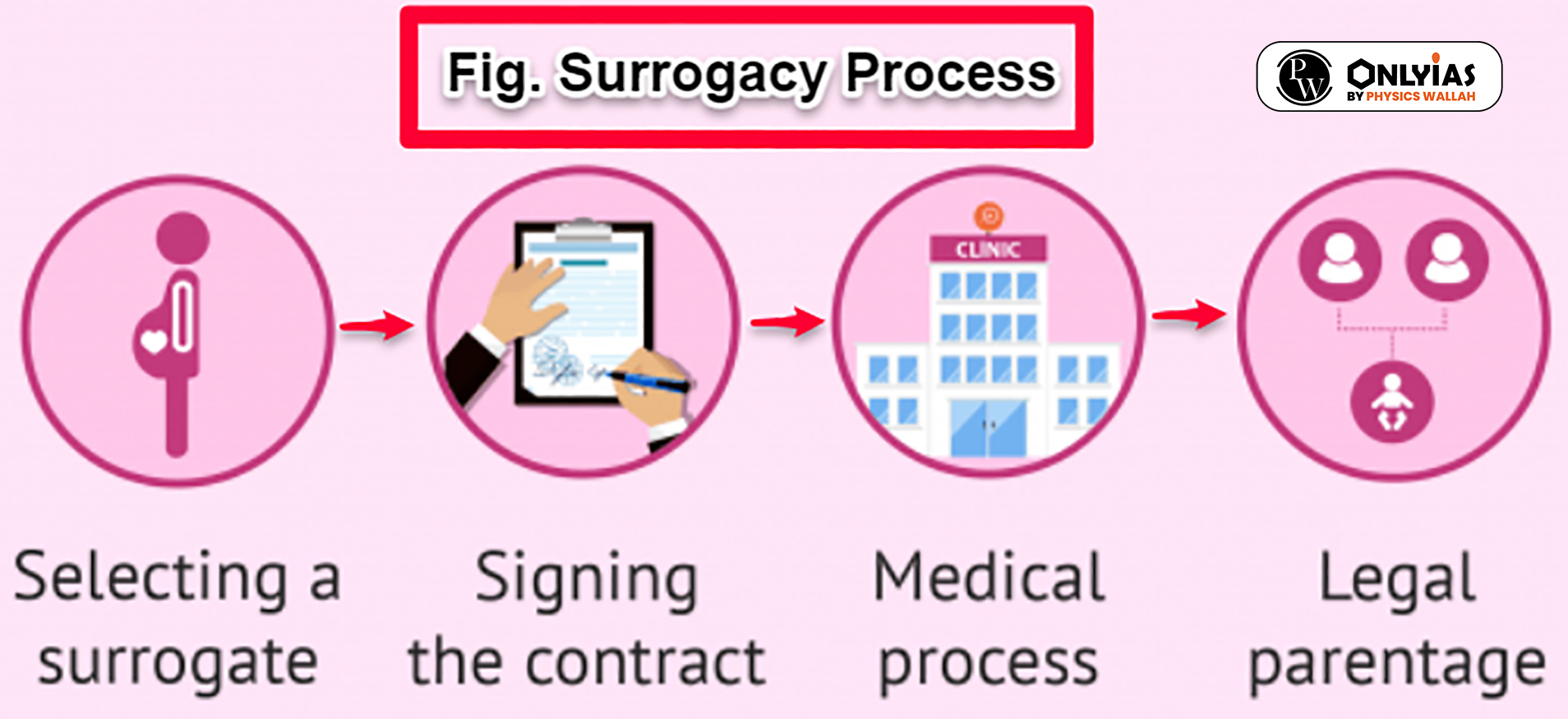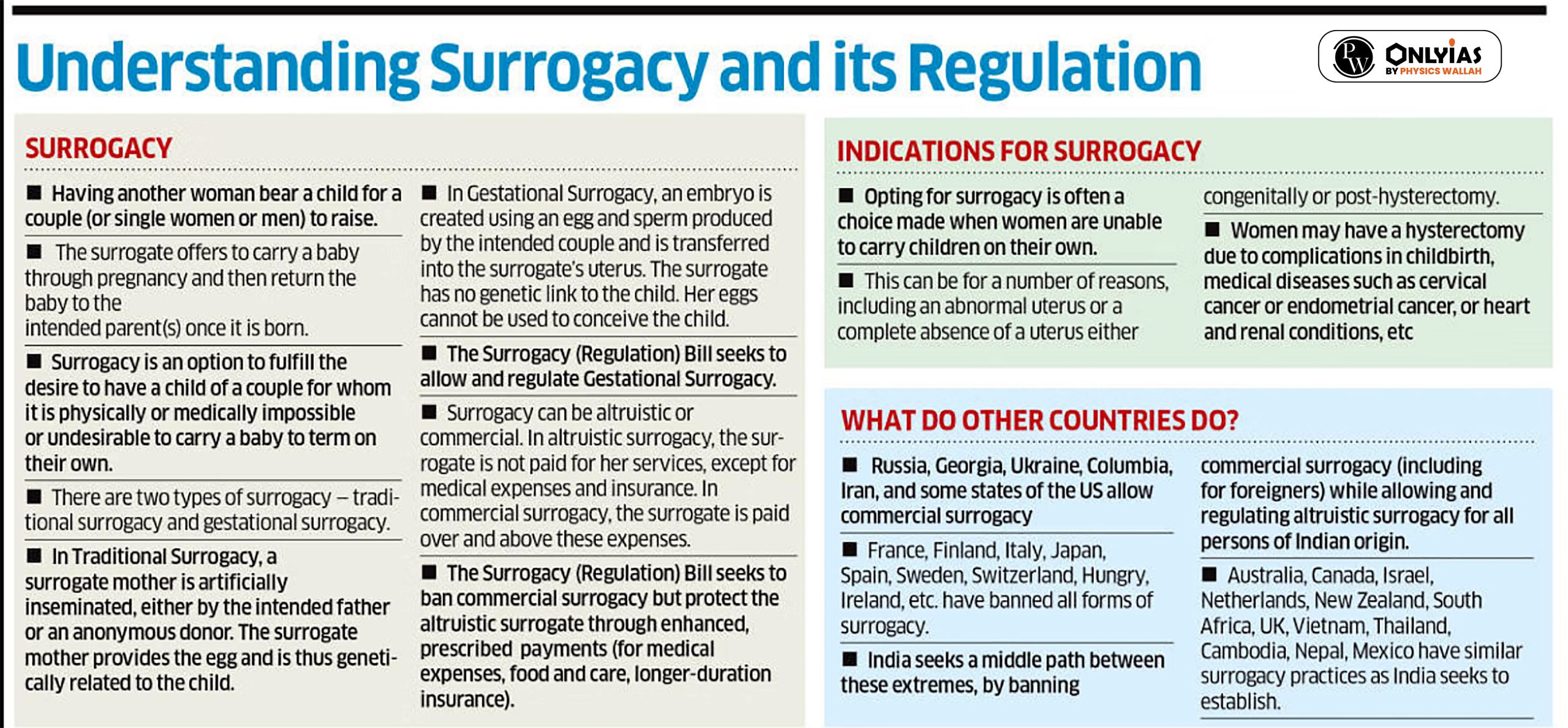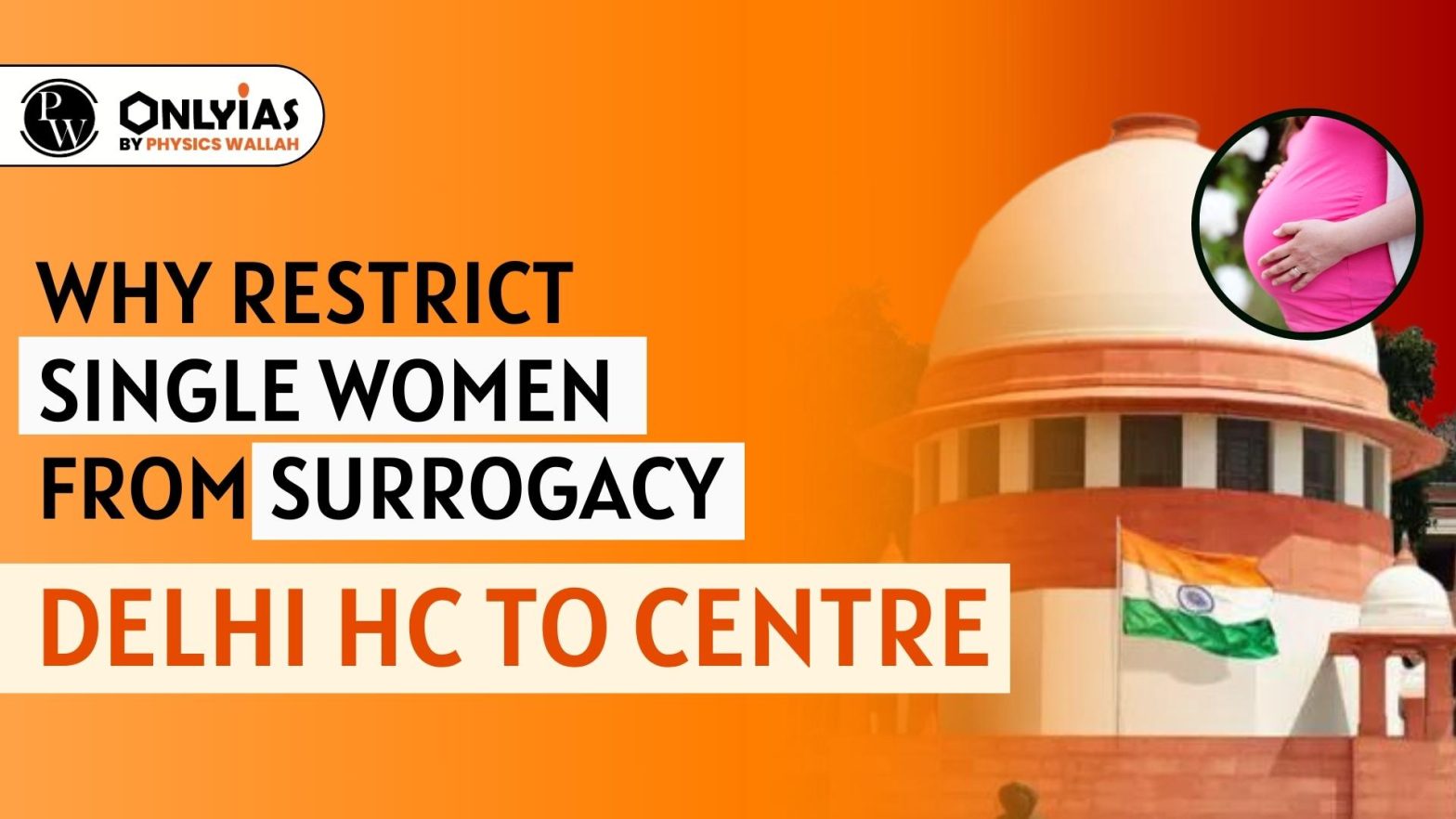Context:
| Relevancy for Prelims: Surrogacy in India, Surrogacy Laws, Surrogacy (Regulation) Act (SRA) 2021, Supreme Court, Fundamental Rights, and Human Rights.
Relevancy for Mains: Surrogacy in India, Surrogacy Law in Court, Surrogacy (Regulation) Act, 2021, Need of Surrogacy Regulation in India and challenges associated with surrogacy. |
Surrogacy Law in Court
- The court was hearing a plea by a 44-year-old single, unmarried woman challenging section 2(1)(s) of the Surrogacy (Regulation) Act (SRA) 2021 which excludes women like her from availing the procedure.
- Under this section, an “intending woman” means an Indian woman who is a “widow” or “divorcee” between the age of 35 and 45 years and who intends to avail the surrogacy.
What is surrogacy?
- Surrogacy is a contractual undertaking whereby the surrogate mother agrees to conceive a child through artificial insemination with the sperm of the natural father, and to terminate all of her parental rights after the child’s birth.
- Altruistic Surrogacy: When the surrogate offers to carry the child of the commissioning couple in her womb purely out of love and empathy for their need to have a child.
- Commercial Surrogacy: When money is paid to the surrogate for her services, it is taken as an act of commercialisation.

- Reasons for booming surrogacy market in India
- Infertility is a growing healthcare which is increasing the need for alternative methods of reproduction to enable people to become parents.
- Availability of potential surrogate mothers.
- Availability of medical technology at an affordable cost.
- Access to high-quality medical care is easy, cheap, and hassle-free.
Surrogacy Law; Surrogacy (Regulation) Act, 2021
- Definition: A practice where a woman gives birth to a child for an intending couple with the intention to hand over the child after the birth to the intending couple.
- Regulation of surrogacy in India
- Prohibits: Commercial surrogacy.
- Permits: Altruistic surrogacy for intending couples who suffer from proven infertility.
- Rights of surrogate child: A child born out of surrogacy procedure, shall be deemed to be a biological child of the intending couple or intending woman.
- Prohibition of abortion: At any stage of surrogacy except in such conditions as may be prescribed.

Surrogacy in India; Assisted Reproductive Technology (Regulation) Act, 2021
- The Assisted Reproductive Technology (ART) (Regulation) Act, 2021, defines ART procedures as all techniques that attempt to obtain a pregnancy by handling the sperm or the oocyte (the immature female egg) outside the human body and transferring into the reproductive system of a woman.
- It regulates the assisted ART clinics and ART banks
- This is open to married couples, live-in partners, single women, and also foreigners.
- ART procedures include gamete donation, intrauterine insemination, and in-vitro fertilisation or IVF.
|
- Surrogacy in India; Eligibility criteria for surrogate mother
- Close relative of the intending couple.
- A married woman having a child of her own.
- Age: 25 to 35 years old.
- Surrogate only once in her lifetime.
- Possess a certificate of medical and psychological fitness for surrogacy.
- The surrogate mother cannot provide her own gametes for surrogacy.
- Surrogacy in India; Other Provisions
- It bans commercial surrogacy, and makes it a non-bailable offence with imprisonment extending to 10 years and with fine upto 10 lakh rupees.
- The Intending Couple: Must be an Indian man and woman, legally married, within the specified age groups with no surviving biological, adopted or surrogate child and must suffer from a medical indication necessitating gestational surrogacy.
- An Intending Woman: Must be a widow or divorcee and within the specified age group.
Surrogacy in India: Why Regulation is Necessary?
- Exploitation Concerns: Surrogate mothers faced economic vulnerabilities, leading to jeopardizing their rights and well-being during and after the surrogacy process.
- Lion’s share is taken by middlemen who connect women with the clinics, leaving little cash with surrogate mothers.
- Commercialization Issues: It raised ethical questions and created a market-driven approach to human reproduction.
- For instance, the contracting party has no obligation towards pregnancy loss, maternal mortality, other health risks, post-natal care and recovery of the surrogate mother.
- Grey Area: The absence of comprehensive and clear legal guidelines created uncertainty for all parties involved, including intended parents, surrogate mothers, and medical practitioners.
- For instance, surrogate mothers often did not know the terms of their contract leading to their economic and social exploitation.
- Parental Rights and Citizenship Issues: Legal uncertainties regarding the citizenship and parental rights of children born through surrogacy need clarification.
What are the challenges associated with surrogacy in India?
- Constitutional Validity of Surrogacy Law: The surrogacy law has been challenged before the Supreme Court.
- Under Sarmishta Chakraborty v/s Union of India the court held that the right of women to have a reproductive choice is an integral part of her personal liberty as enshrined under Article 21 of the Indian Constitution.
- Against Right to Equality: Permitting limited conditional surrogacy to married Indian couples and disqualifying other persons on basis of nationality, marital status, sexual orientation or age does not pass the test of equality.
- The surrogacy law is seen as discriminatory, exclusionary and arbitrary, and negates reproductive rights.
- Against Same-Sex Couples: In the event of same-sex marriage becoming legal in India, the surrogacy law may deny a legally married male homosexual couple a biological child through surrogacy to complete their family.
- This violates the personal rights of the LGBTQ community and goes against the Supreme Court of India decisions, including Navtej Singh Johar v. Union of India case.
- High Potential Misuse: Section 42 of the Surrogacy Act presumes that the surrogate mother was compelled by the intending couple to render surrogacy services.
- A surrogate mother can negate an altruistic surrogacy agreement or allege that her consent was taken on account of some fear of injury, or under a misconception to compel the intending couple to give extortionist payments.
- Unsupportive to Medical Practitioner: The Act provides for 10 years of imprisonment and a fine of Rs 10 lakh for a medical practitioner for contravention of any provision of the Act. It will fend off doctors and they might not undertake surrogacy procedures.
- Balancing Competing Interests: On the one hand, the state has a responsibility to safeguard the interests of the unborn child and prohibit the surrogate’s exploitation.
- On the other hand, lies the right of women to control their own reproductive processes and the right of individuals to parent.
- Surrogacy laws in India have had difficulty striking a balance between these competing interests.
Surrogacy in India; Way Forward
- Ensuring Human Rights are Upheld: Universal Declaration of Human Rights proclaims that all men and women of full age have the right to found a family [Article 16(1)] and to the decisions of Indian Supreme Court declaring that family, procreation and sexual orientation are integral to the dignity of an individual.
- Solving Ethical Dilemmas: Some argue that surrogacy exploits and commodifies women’s bodies and children. Loss of natural reproduction can cause psychological problems for the surrogate mother.
- However, according to the utilitarian stance, whatever is beneficial to the greatest number of people is considered to be good. In this case, the couple completes their family and surrogates may receive monetary or other kinds of benefits.

- Providing Practical Solutions: Unlike the proverbial ostrich burying its head in the sand, hoping that the surrogacy market will disappear by merely banning commercial surrogacy, the government may improve the regulation of surrogacy in India.
- The implementation of the laws must be periodically reviewed including regular consultations with stakeholders to ensure that the rights of the surrogates, children born into surrogacy, and ART donors are protected.
Conclusion:
Instead of imposing a ban, the commercial surrogacy market, a balanced path by the Government would be the adoption of a rights-based approach addressing the concerns of the surrogate mother, children born out of surrogacy, and other stakeholders in the surrogacy market.
| Prelims Question (2021)
In the context of hereditary diseases, consider the following statements:
1. Passing on mitochondrial diseases from parent to child can be prevented by mitochondrial replacement therapy either before or after in vitro fertilization of egg.
2. A child inherits mitochondrial diseases entirely from mother and not from father.
Which of the statements given above is/are correct?
(a) 1 only
(b) 2 only
(c) Both 1 and 2
(d) Neither 1 nor 2
Ans: (c) |




